CHINESE
COINS & CURRENCY
All items guaranteed to
be genuine. I have over 50 years experience with Chinese
coins and buy only from reliable suppliers in the United States.THE DISASTROUS REIGN OF WANG
MANG
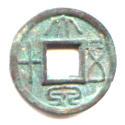
Wang Mang
arranged to have himself appointed regent for the young Han Emperor in
7AD. Two years later he murdered the boy, usurped the throne and
founded the short-lived Xin Dynasty. He attempted major
reforms of China's economy including the abolition of slavery,
introduction of an income tax, redistribution of the land, institution
of price controls, and confiscation of gold. He demonetized
existing coins and instituted new ones based on an unbacked fiat
coinage. Despite the execution and exile of thousands, the reforms were
not accepted. The economy collapsed; there were widespread general
strikes and massive starvation. In 23AD Wang was slain, his "reforms"
were abolished and the Han dynasty restored. This Da Quan Wu
Shi (Ta Ch'ien Wu Shih) coin was introduced in 7AD as part of his
monetary reforms. Though only slightly heavier than the
existing Wu Zhu (Wu Ch'u) that had been in use for 200 years, it was
worth 50 Wu Zhu. As might be expected the merchants did not take too
kindly to this new coin. In 14AD the Ta Chi'en Wu Shih coin
was discontinued and its value reduced from 50 Cash to 1
Cash.
Item
CN-DA-QUAN CHINA WANG MANG 50 CASH COIN,
7-14AD, Scj.120+, H9.2 VF
$15.00
RARE
COIN FROM CHINA'S SHORT LIVED
WESTERN WEI DYNASTY
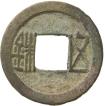
The
Western Wei Dynasty was one of many short-lived dynasties that
controlled portions of China during a period of civil war and political
chaos that followed the collapse of the Eastern Han Dynasty in 220AD.
It lasted only from 535 to 557AD and controlled a portion of
north-western China. The dynasty issued a distinctive style of Wu Zhu
(Wu Chu) coin. For many years this coin was attributed to the
subsequent Sui Dynasty (581-618AD) until a hoard of the coins was
discovered in the tomb of Emperor Wen, the first emperor Western Wei.
Dynasty, who died in 550AD.
Item
CN-WEI WESTERN WEI DYNASTY WU CHU
COIN, 535-551AD Sch. 253, H10.25 VF
$8.00
Item
CN-WEIx5 5 of the above WESTERN WEI WU CHU
COINS, VF
$29.50
FAMOUS
K'AI YUAN COIN OF THE TANG
DYNASTY

The
K'ai Yuan coin was introduced by Chinese Emperor Kao Tsu, who founded
the Tang Dyansty in 618AD. The coins replaced the previously
used Wu-Chu and other coins. The high quality of the coins
and excellent calligraphy set a standard for Chinese coins for the next
1000 years! The legend on the coin, K'ai Yuan Tung
Pao translates as "precious currency of the K'ai Yuan
era". The Tang Dynasty was a brilliant period in
Chinese history. It was an era of great prosperity and
artistry. The K'ai Yuan coin continued to be issued
for the next 300 years, until the collapse of the Dynasty in
907AD. During much of the dynasty the coin was the
only denomination struck. Because of the relatively low value
of the coin and the high level of commerce a LOT of the coins were
issued during that period. (Think of doing all your transactions with
only pennies!) As a result the coin, though over
1000 years old, is still plentiful and inexpensive.
Item
CN-TANG CHINA K'AI YUAN 1 CASH COIN
618-907AD
Scj. 312+ Fine-VF
$4.50
 OLD COINS OF
CHINA by Holger
Jorgensen
OLD COINS OF
CHINA by Holger
Jorgensen
A
small but complete identification guide book for Chinese cash coins
from
600BC
to 1912AD. Best book if you just want to identify Chinese cash
coins
by
emperor and date without going into varieties. Features line drawings
of
coins with reign title and reign dates, but not much further
information. Reprint. 26
pages
and plates. 5.5" x 8.5", softcover.
Item
BK-Jorgensen Book: OLD COINS OF CHINA by
Holger Jorgensen
$6.00
OLD CHINESE
LOTTERY LOAN BOND
The Republic of China issued this 5 Dollar Second Nationalist
Government Lottery Loan bond in 1926 to raise money to finance
improvements in the Port of Whampoa in Canton, (now Pazou, a section of
Guangzhou). Rather than pay interest the bonds were
automatically entered into a tri-monthly lottery that paid prizes from
$1,000 to $50,000. This made the bonds popular with the Chinese, who
are natural gamblers. The front of the bond is in Chinese,
the reverse in English. Both the front and back are
underprinted with a map of the port. The bonds specify that they are
denominated as "5 Dollars Canton Currency". At the
time the bond was issued China was involved in a three-way civil war
between Northern China, Southern China and the Communists, each issuing
its own currency, so it was necessary to specify which exactly Chinese
currency. The bond measures about 7 1/4" x 5" (18cm
x 13cm).
Item
BND-CN26-5D CHINA 5
DOLLARS 1926 LOTTERY LOAN BOND, VF-XF
$10.00
2019 CIRCULATING
COINS OF CHINA
The People's Republic of China recently released new versions of the 1
and 5 Jiao and 1 Yuan coins with updated designs. All three coins
continue to feature flowers on the reverse. The size of the 1
Yuan is reduced from 25mm to 22.5mm. The numeral "1"
incorporates latent image of “¥” and “1”. The
coin has a lettered edge with "
RMB"
repeated three times. The
metallic content of the 5 Jiao is changed to nickel-plated steel, the
typeface of the denomination revised and the orchid blossoms on the
reverse scaled down. The numeral on the 1 Jiao was also
revised and the orchid on the reverse scaled
down.
Item
CN-SET19
CHINA 3 COIN SET, 1 JIAO - 1 YUAN 2019, UNC. $3.00
CHINA CELEBRATES
YEAR OF THE
TIGER
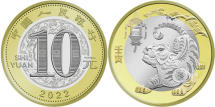
China
commemorated the Year of the Tiger with this attractive 27mm
bi-metallic 2022 dated 10 Yuan coin. The reverse depicts a traditional
artistic paper-cutting of a tiger, a palace lantern and tree
branches. The obverse features the denomination surrounded by
an intricate etched floral design. The large number 10 contains latent
images which change from "R M B" to "10 10 10" when the coin is moved.
The design also features micro-letters and other anti-counterfeiting
devices.
Item
CN-TIGER22
CHINA 10 YUAN 2022 YEAR OF THE TIGER, BI-METALLIC BU
$8.00
SQUARE CHINESE 5 YUAN COMMEMORATES
TAISHAN MOUNTAIN

China
issued a square 2019 dated 5 Yuan honoring Taishan Mountain, also known
as Mount Tai. For over 3000 years the iconic mountain has
been an important aspect of Chinese culture. Emperors would
perform sacrifices and poets would find inspiration on the
mountain. It houses multiple shrines and is
associated with a number of Chinese deities. Today it is a
UNESCO World Cultural and Natural Heritage site and a popular tourist
destination. The bronze 30mm coin depicts the Taishan
Mountain on one side and the emblem of the People's Republic of China
on the other. The design incorporates a number of anti-counterfeiting
devices, including a shifting image and a series of tiny dots hidden in
two locations in the design.
Item
CN-TAI19
CHINA 5 YUAN 2019 MOUNT TAI BU 7.50
SQUARE CHINESE 2020 5
YUAN COMMEMORATES THE WUYI MOUNTAINS
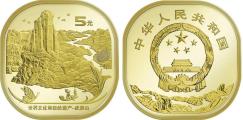
China
continued their annual series featuring UNESCO heritage sites with this
square 2020 5 Yuan honoring the Wuyi mountains.
Wuyi is a range of mountains around the border of Fujian and Jiangxi
provinces. It is noted for its spectacular scenery, many
caves, diverse plant and wildlife that includes more than 1000 rare
species as well has many historical and religious sites. One
side of the 27.2mm brass coin depicts the distinctive Yunnu hill, a
butterfly and two men on a raft on the Nine-bend River. The
other side portrays the emblem of the People's Republic of China. The
design incorporates a number of anti-counterfeiting devices, including
a shifting image and a series of tiny dots hidden in in the design.
Item
CN-WUYI CHINA 5 YUAN 2020 MOUNT WUYI BU $6.00
CHINA
2022 WORLD HERITAGE SQUARE 5 YUAN COINS
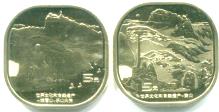
China
released two 2022 dated square brass 5 Yuan coins featuring two
UNESCO World Heritage sites. One depicts the Mount Emei and the Leshan
Giant Buddha. Mount Emei, at 10,167 feet (3,099m) is the
highest of the Four Sacred Buddhist Mountains of China. It is
the location of the first Buddhist temple built in China during the
first Century AD. Nearby is the Leshan Giant Buddha, a 233
foot (71m) carved stone statue of Buddha. In comparison the statues on
Mount Rushmore are only about 60 feet high. It was built
between 713 and 803AD and is still the largest and tallest stone Buddha
in the world. It was started by a monk who believed that the
Buddha would calm the turbulent rapids that plagued boats traveling
down the adjacent river. So much stone was removed
from the cliff face and deposited in the river that the currents were
altered, making it safe for boats. The other coin
depicts of Mount Huangshan, which means Yellow Mountain. It
is often described as the “loveliest mountain of China”, and has played
an important role in the history of art and literature in China since
the Tang Dynasty in the 8th century. Today it is a popular
tourist destination with numerous trails and walking paths.
Item
CN-5Y-SET22 CHINA SET OF 2 FIVE YUAN, MOUNT
EMEI & MOUNT HUANGSHAN, 2022 BU
$8.00
2023
CHINESE SILVER PANDA

China
continues their popular annual silver Panda coin series with this
2023 issue depicting two young pandas playing in a tree. They
are facing each other, one in the tree and one below, extending their
paws as if one is offering the other a “hand” up in the tree.
The coin was designed by China Mint's coin designer Tong Fang, who
designed many of the previous coins in the acclaimed Panda
series. The obverse features the Temple of Heaven in Beijing
and the date. The Brilliant Uncirculated 40mm
coin has a nominal face value of 10 Yuan, contain 30 grams of .999 fine
silver and comes in a protective capsule.
Item
CN-PANDA23
CHINA 10 YUAN 2023 SILVER PANDA BU
$54.00
2024
CHINA SILVER PANDA
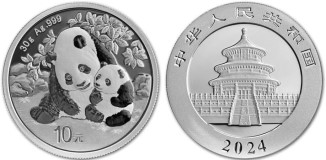
China
continued their popular silver Panda series with this 2024 issue
depicting a mother panda and her cub. The mother is the panda
that was depicted as a cub on the 2019 issue! The obverse
includes the date and the Temple of Heaven in Beijing. The
Brilliant Uncirculated 40mm coins have a nominal face value of 10 Yuan,
contain 30 grams of .999 fine silver and comes in a protective capsule.
Item
CN-PANDA24 CHINA 2024 SILVER PANDA BU $54.00
2024 BI-METALLIC
CHINA TIGER
& LEOPARD PARK COMMEMORATIVE

China
commemorated the Northeast China Tiger and Leopard National Park on
this 2024 bi-metallic 10 Yuan coin. The park was launched in 2017. It
covers 5,642 square miles (14,612 sq.km.) bordering Russia and North
Korea. The coin depicts a tiger sitting in the foreground and
a
walking leopard in the background. The emblem of China and
the date
are on the obverse of the 27mm coin.
Item
CN-10Y24-TIGER CHINA 10 YUAN 2024 TIGER
& LEOPARD PARK BU $6.00
CHINA 2025 YEAR
OF THE SNAKE
COIN AND BANKNOTE


China
released a 2025
dated bi-metallic 10 Yuan coin and a colorful 2024 20 Yuan polymer
banknote to commemorate the Year of the Snake. The 27mm coin
depicts a
traditional artistic paper cutting of a snake, a palace lantern, and
plants the reverse. The denomination surrounded by an
intricate etched
design is on the obverse. The large number 10 contains latent images,
which change from Western to Chinese characters as the coin is
moved.
The 20 Yuan note features a stylized snake, the denomination in SPARK
optical and a clear window on the front. The back features
three
children hanging a Spring Festival banner in front of Shanxi residents
and legends in Chinese, Mongolian, Tibetan, Uyghur and Zhang.
Item
CN-SNAKE25 CHINA 10 YUAN 2025 YEAR OF THE
SNAKE COIN, BU
$8.00
Item
PM-CN-20Y-SNAKE CHINA 20 YUAN 2025 YEAR OF
THE SNAKE BANKNOTE, UNC.
$16.00
ALSO SEE:
 AUSTRALIA 2025 YEAR OF THE SNAKE SILVER DOLLAR
AUSTRALIA 2025 YEAR OF THE SNAKE SILVER DOLLAR
 CHINA
2025 BI-METALLIC 10 YUAN HAINAN RAINFOREST NATIONAL PARK
CHINA
2025 BI-METALLIC 10 YUAN HAINAN RAINFOREST NATIONAL PARK
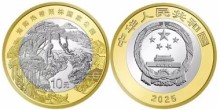
China
released a 2025 bi-metallic 10 Yuan commemorating the Hainan Rainforest
National Park. The park encompasses about 1650 square miles
(4259 sq.km.) of the central part of Hainan, which is an island off the
southern coast of China. The park is noted for its large
diversity of plants and wildlife. The 27mm coin features the parks
scenery which includes two Hainan gibbons, the Wanquan River and Wuzhi
Mountain. At the bottom is a Hainan peacock-pheasant.
Item
CN-10Y25-HAINAN CHINA 10 YUAN 2025 HAINAN
RAINFOREST NATIONAL PARK BU
$6.00
 WORLD WAR II JAPANESE
MILITARY CURRENCY FOR HONG KONG
WORLD WAR II JAPANESE
MILITARY CURRENCY FOR HONG KONG
Japan issued this 100 Yen note for use in Hong Kong in the closing
months of World War II. It was the highest denomination military
currency issued by Japan. The note, apparently printed in Hong Kong,
utilized the basic design of the 1944 Japanese homeland 100 Yen note,
however with modified legends on the back and the front has an
overprint that translates as "Military Currency". The note pictures the
Yumedono Pavilion, or Hall of Dreams. It was constructed in
739 as a monument to the semi-legendary Prince Shotoku Taishi on the
site of the prince's palace. The prince is pictured to the
right within a green circle. Because civilians were forced to accept
were forced to accept the unbacked Military Yen it cost the Japanese
government virtually nothing to purchase whatever they
wanted. The note large sized note is 163 x 94mm and is
Uncirculated.
Item
PM-CN-M100Y JAPANESE MILITARY CURRENCY FOR HONG KONG 100 YEN 1945 PM30 AU-UNC.
$12.00
Item
PM-CN-M100Yx5 5 of the above JAPANESE MILITARY 100 YEN NOTES 1945 PM30 AU-UNC.
$45.00
 BEAUTIFUL
CHINESE
MOTHER OF PEARL GAMBLING TOKENS
BEAUTIFUL
CHINESE
MOTHER OF PEARL GAMBLING TOKENS

These
beautiful, hand carved mother-of-pearl gambling tokens were made in
China from about 1720 until about 1840 and used in Europe and America
gaming counters and gambling chips. They come in a wide variety of
shapes (round, rectangular, oval, even fish shaped) and sizes and are
etched with intricate patterns and motifs. Most are about 28mm to
55mm.
Item CN-MOPx1 1 CHINESE MOTHER OF PEARL
GAMBLING TOKEN
$25.00
MACAU
1 PATACA FEATURES HISTORIC
LIGHTHOUSE AND CHAPEL

The
Guia Lighthouse and Chapel are featured on this 1992 Macau (Macao) 1
Pataca coin. The Chapel and adjoining fort were constructed
between 1622 and 1638. The lighthouse was added in 1865 and
was the first lighthouse on the coast of China. It is visible
for some 20 miles (32km) in clear weather. The complex is a UNICEF
World Heritage site and are symbols of Macau.. Unfortunately
views of the famous lighthouse and chapel were blocked with the
construction of the Chinese Liaison Office in 2010. The obverse
includes a bat above stylized Chinese characters for Macau.
In Chinese lore bats bring the five blessings: life, wealth, health,
virtue & death after achieving one's destiny.
Item
MO-1P MACAU 1 PATACA 1992 KM57 GUIA
LIGHTHOUSE UNC. $5.00
TAIWAN
CELEBRATES
LIBERATION FROM JAPAN
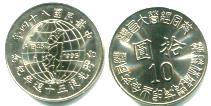
After
several unsuccessful attempts to gain control of Taiwan (Formosa),
Japan took the island from
China in 1895 as a result of China's defeat
in the First Sino-Japanese War. Upon Japan's defeat in 1945
in World War II, China regained control of Taiwan. In 1995
the Republic of China, (now commonly called Taiwan), commemorated the
50th Anniversary of its liberation from Japan. The 26mm
copper-nickel 10 Yuan coin features a map of Taiwan and the dates 1945
1995.
Item
TAIWAN-LIB TAIWAN 10 YUAN 1995
LIBERATION Y555 UNC. $3.50
OLD
COIN FROM FAR OFF TIBET 
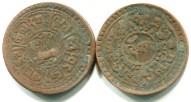
Tibet is a fabled and
isolated country located
high in the Himalayas that is now controlled by China. This copper 1
Sho coin was issued from 1918 to 1928. It features a snow
lion on one side and inscriptions on the other. The
Snow Lion is a mythological animal that represents cheerfulness and
clarity of thought.
Item
TIB-SHO TIBET 1 SHO 1918-1928
Y21variety F-VF $5.00
<--
PREVIOUS PAGE NEXT
PAGE -->
 ON-LINE ORDER FORM
ON-LINE ORDER FORM Alphabetical Listings
Alphabetical Listings Coins by theme or topic
Coins by theme or topic New Arrivals
New Arrivals World Coin Sets List
World Coin Sets List Site Map
Site Map Home Page
Home Page ON-LINE ORDER FORM
ON-LINE ORDER FORM Alphabetical Listings
Alphabetical Listings Coins by theme or topic
Coins by theme or topic New Arrivals
New Arrivals World Coin Sets List
World Coin Sets List Site Map
Site Map Home Page
Home Page Wang Mang
arranged to have himself appointed regent for the young Han Emperor in
7AD. Two years later he murdered the boy, usurped the throne and
founded the short-lived Xin Dynasty. He attempted major
reforms of China's economy including the abolition of slavery,
introduction of an income tax, redistribution of the land, institution
of price controls, and confiscation of gold. He demonetized
existing coins and instituted new ones based on an unbacked fiat
coinage. Despite the execution and exile of thousands, the reforms were
not accepted. The economy collapsed; there were widespread general
strikes and massive starvation. In 23AD Wang was slain, his "reforms"
were abolished and the Han dynasty restored. This Da Quan Wu
Shi (Ta Ch'ien Wu Shih) coin was introduced in 7AD as part of his
monetary reforms. Though only slightly heavier than the
existing Wu Zhu (Wu Ch'u) that had been in use for 200 years, it was
worth 50 Wu Zhu. As might be expected the merchants did not take too
kindly to this new coin. In 14AD the Ta Chi'en Wu Shih coin
was discontinued and its value reduced from 50 Cash to 1
Cash.
Wang Mang
arranged to have himself appointed regent for the young Han Emperor in
7AD. Two years later he murdered the boy, usurped the throne and
founded the short-lived Xin Dynasty. He attempted major
reforms of China's economy including the abolition of slavery,
introduction of an income tax, redistribution of the land, institution
of price controls, and confiscation of gold. He demonetized
existing coins and instituted new ones based on an unbacked fiat
coinage. Despite the execution and exile of thousands, the reforms were
not accepted. The economy collapsed; there were widespread general
strikes and massive starvation. In 23AD Wang was slain, his "reforms"
were abolished and the Han dynasty restored. This Da Quan Wu
Shi (Ta Ch'ien Wu Shih) coin was introduced in 7AD as part of his
monetary reforms. Though only slightly heavier than the
existing Wu Zhu (Wu Ch'u) that had been in use for 200 years, it was
worth 50 Wu Zhu. As might be expected the merchants did not take too
kindly to this new coin. In 14AD the Ta Chi'en Wu Shih coin
was discontinued and its value reduced from 50 Cash to 1
Cash.  The
Western Wei Dynasty was one of many short-lived dynasties that
controlled portions of China during a period of civil war and political
chaos that followed the collapse of the Eastern Han Dynasty in 220AD.
It lasted only from 535 to 557AD and controlled a portion of
north-western China. The dynasty issued a distinctive style of Wu Zhu
(Wu Chu) coin. For many years this coin was attributed to the
subsequent Sui Dynasty (581-618AD) until a hoard of the coins was
discovered in the tomb of Emperor Wen, the first emperor Western Wei.
Dynasty, who died in 550AD.
The
Western Wei Dynasty was one of many short-lived dynasties that
controlled portions of China during a period of civil war and political
chaos that followed the collapse of the Eastern Han Dynasty in 220AD.
It lasted only from 535 to 557AD and controlled a portion of
north-western China. The dynasty issued a distinctive style of Wu Zhu
(Wu Chu) coin. For many years this coin was attributed to the
subsequent Sui Dynasty (581-618AD) until a hoard of the coins was
discovered in the tomb of Emperor Wen, the first emperor Western Wei.
Dynasty, who died in 550AD. The
K'ai Yuan coin was introduced by Chinese Emperor Kao Tsu, who founded
the Tang Dyansty in 618AD. The coins replaced the previously
used Wu-Chu and other coins. The high quality of the coins
and excellent calligraphy set a standard for Chinese coins for the next
1000 years! The legend on the coin, K'ai Yuan Tung
Pao translates as "precious currency of the K'ai Yuan
era". The Tang Dynasty was a brilliant period in
Chinese history. It was an era of great prosperity and
artistry. The K'ai Yuan coin continued to be issued
for the next 300 years, until the collapse of the Dynasty in
907AD. During much of the dynasty the coin was the
only denomination struck. Because of the relatively low value
of the coin and the high level of commerce a LOT of the coins were
issued during that period. (Think of doing all your transactions with
only pennies!) As a result the coin, though over
1000 years old, is still plentiful and inexpensive.
The
K'ai Yuan coin was introduced by Chinese Emperor Kao Tsu, who founded
the Tang Dyansty in 618AD. The coins replaced the previously
used Wu-Chu and other coins. The high quality of the coins
and excellent calligraphy set a standard for Chinese coins for the next
1000 years! The legend on the coin, K'ai Yuan Tung
Pao translates as "precious currency of the K'ai Yuan
era". The Tang Dynasty was a brilliant period in
Chinese history. It was an era of great prosperity and
artistry. The K'ai Yuan coin continued to be issued
for the next 300 years, until the collapse of the Dynasty in
907AD. During much of the dynasty the coin was the
only denomination struck. Because of the relatively low value
of the coin and the high level of commerce a LOT of the coins were
issued during that period. (Think of doing all your transactions with
only pennies!) As a result the coin, though over
1000 years old, is still plentiful and inexpensive. OLD COINS OF
CHINA by Holger
Jorgensen
OLD COINS OF
CHINA by Holger
Jorgensen China
commemorated the Year of the Tiger with this attractive 27mm
bi-metallic 2022 dated 10 Yuan coin. The reverse depicts a traditional
artistic paper-cutting of a tiger, a palace lantern and tree
branches. The obverse features the denomination surrounded by
an intricate etched floral design. The large number 10 contains latent
images which change from "R M B" to "10 10 10" when the coin is moved.
The design also features micro-letters and other anti-counterfeiting
devices.
China
commemorated the Year of the Tiger with this attractive 27mm
bi-metallic 2022 dated 10 Yuan coin. The reverse depicts a traditional
artistic paper-cutting of a tiger, a palace lantern and tree
branches. The obverse features the denomination surrounded by
an intricate etched floral design. The large number 10 contains latent
images which change from "R M B" to "10 10 10" when the coin is moved.
The design also features micro-letters and other anti-counterfeiting
devices.  China
issued a square 2019 dated 5 Yuan honoring Taishan Mountain, also known
as Mount Tai. For over 3000 years the iconic mountain has
been an important aspect of Chinese culture. Emperors would
perform sacrifices and poets would find inspiration on the
mountain. It houses multiple shrines and is
associated with a number of Chinese deities. Today it is a
UNESCO World Cultural and Natural Heritage site and a popular tourist
destination. The bronze 30mm coin depicts the Taishan
Mountain on one side and the emblem of the People's Republic of China
on the other. The design incorporates a number of anti-counterfeiting
devices, including a shifting image and a series of tiny dots hidden in
two locations in the design.
China
issued a square 2019 dated 5 Yuan honoring Taishan Mountain, also known
as Mount Tai. For over 3000 years the iconic mountain has
been an important aspect of Chinese culture. Emperors would
perform sacrifices and poets would find inspiration on the
mountain. It houses multiple shrines and is
associated with a number of Chinese deities. Today it is a
UNESCO World Cultural and Natural Heritage site and a popular tourist
destination. The bronze 30mm coin depicts the Taishan
Mountain on one side and the emblem of the People's Republic of China
on the other. The design incorporates a number of anti-counterfeiting
devices, including a shifting image and a series of tiny dots hidden in
two locations in the design.  China
continued their annual series featuring UNESCO heritage sites with this
square 2020 5 Yuan honoring the Wuyi mountains.
Wuyi is a range of mountains around the border of Fujian and Jiangxi
provinces. It is noted for its spectacular scenery, many
caves, diverse plant and wildlife that includes more than 1000 rare
species as well has many historical and religious sites. One
side of the 27.2mm brass coin depicts the distinctive Yunnu hill, a
butterfly and two men on a raft on the Nine-bend River. The
other side portrays the emblem of the People's Republic of China. The
design incorporates a number of anti-counterfeiting devices, including
a shifting image and a series of tiny dots hidden in in the design.
China
continued their annual series featuring UNESCO heritage sites with this
square 2020 5 Yuan honoring the Wuyi mountains.
Wuyi is a range of mountains around the border of Fujian and Jiangxi
provinces. It is noted for its spectacular scenery, many
caves, diverse plant and wildlife that includes more than 1000 rare
species as well has many historical and religious sites. One
side of the 27.2mm brass coin depicts the distinctive Yunnu hill, a
butterfly and two men on a raft on the Nine-bend River. The
other side portrays the emblem of the People's Republic of China. The
design incorporates a number of anti-counterfeiting devices, including
a shifting image and a series of tiny dots hidden in in the design.  China
released two 2022 dated square brass 5 Yuan coins featuring two
UNESCO World Heritage sites. One depicts the Mount Emei and the Leshan
Giant Buddha. Mount Emei, at 10,167 feet (3,099m) is the
highest of the Four Sacred Buddhist Mountains of China. It is
the location of the first Buddhist temple built in China during the
first Century AD. Nearby is the Leshan Giant Buddha, a 233
foot (71m) carved stone statue of Buddha. In comparison the statues on
Mount Rushmore are only about 60 feet high. It was built
between 713 and 803AD and is still the largest and tallest stone Buddha
in the world. It was started by a monk who believed that the
Buddha would calm the turbulent rapids that plagued boats traveling
down the adjacent river. So much stone was removed
from the cliff face and deposited in the river that the currents were
altered, making it safe for boats. The other coin
depicts of Mount Huangshan, which means Yellow Mountain. It
is often described as the “loveliest mountain of China”, and has played
an important role in the history of art and literature in China since
the Tang Dynasty in the 8th century. Today it is a popular
tourist destination with numerous trails and walking paths.
China
released two 2022 dated square brass 5 Yuan coins featuring two
UNESCO World Heritage sites. One depicts the Mount Emei and the Leshan
Giant Buddha. Mount Emei, at 10,167 feet (3,099m) is the
highest of the Four Sacred Buddhist Mountains of China. It is
the location of the first Buddhist temple built in China during the
first Century AD. Nearby is the Leshan Giant Buddha, a 233
foot (71m) carved stone statue of Buddha. In comparison the statues on
Mount Rushmore are only about 60 feet high. It was built
between 713 and 803AD and is still the largest and tallest stone Buddha
in the world. It was started by a monk who believed that the
Buddha would calm the turbulent rapids that plagued boats traveling
down the adjacent river. So much stone was removed
from the cliff face and deposited in the river that the currents were
altered, making it safe for boats. The other coin
depicts of Mount Huangshan, which means Yellow Mountain. It
is often described as the “loveliest mountain of China”, and has played
an important role in the history of art and literature in China since
the Tang Dynasty in the 8th century. Today it is a popular
tourist destination with numerous trails and walking paths.  China
continues their popular annual silver Panda coin series with this
2023 issue depicting two young pandas playing in a tree. They
are facing each other, one in the tree and one below, extending their
paws as if one is offering the other a “hand” up in the tree.
The coin was designed by China Mint's coin designer Tong Fang, who
designed many of the previous coins in the acclaimed Panda
series. The obverse features the Temple of Heaven in Beijing
and the date. The Brilliant Uncirculated 40mm
coin has a nominal face value of 10 Yuan, contain 30 grams of .999 fine
silver and comes in a protective capsule.
China
continues their popular annual silver Panda coin series with this
2023 issue depicting two young pandas playing in a tree. They
are facing each other, one in the tree and one below, extending their
paws as if one is offering the other a “hand” up in the tree.
The coin was designed by China Mint's coin designer Tong Fang, who
designed many of the previous coins in the acclaimed Panda
series. The obverse features the Temple of Heaven in Beijing
and the date. The Brilliant Uncirculated 40mm
coin has a nominal face value of 10 Yuan, contain 30 grams of .999 fine
silver and comes in a protective capsule.  China
continued their popular silver Panda series with this 2024 issue
depicting a mother panda and her cub. The mother is the panda
that was depicted as a cub on the 2019 issue! The obverse
includes the date and the Temple of Heaven in Beijing. The
Brilliant Uncirculated 40mm coins have a nominal face value of 10 Yuan,
contain 30 grams of .999 fine silver and comes in a protective capsule.
China
continued their popular silver Panda series with this 2024 issue
depicting a mother panda and her cub. The mother is the panda
that was depicted as a cub on the 2019 issue! The obverse
includes the date and the Temple of Heaven in Beijing. The
Brilliant Uncirculated 40mm coins have a nominal face value of 10 Yuan,
contain 30 grams of .999 fine silver and comes in a protective capsule. China
commemorated the Northeast China Tiger and Leopard National Park on
this 2024 bi-metallic 10 Yuan coin. The park was launched in 2017. It
covers 5,642 square miles (14,612 sq.km.) bordering Russia and North
Korea. The coin depicts a tiger sitting in the foreground and
a
walking leopard in the background. The emblem of China and
the date
are on the obverse of the 27mm coin.
China
commemorated the Northeast China Tiger and Leopard National Park on
this 2024 bi-metallic 10 Yuan coin. The park was launched in 2017. It
covers 5,642 square miles (14,612 sq.km.) bordering Russia and North
Korea. The coin depicts a tiger sitting in the foreground and
a
walking leopard in the background. The emblem of China and
the date
are on the obverse of the 27mm coin.
 China
released a 2025
dated bi-metallic 10 Yuan coin and a colorful 2024 20 Yuan polymer
banknote to commemorate the Year of the Snake. The 27mm coin
depicts a
traditional artistic paper cutting of a snake, a palace lantern, and
plants the reverse. The denomination surrounded by an
intricate etched
design is on the obverse. The large number 10 contains latent images,
which change from Western to Chinese characters as the coin is
moved.
The 20 Yuan note features a stylized snake, the denomination in SPARK
optical and a clear window on the front. The back features
three
children hanging a Spring Festival banner in front of Shanxi residents
and legends in Chinese, Mongolian, Tibetan, Uyghur and Zhang.
China
released a 2025
dated bi-metallic 10 Yuan coin and a colorful 2024 20 Yuan polymer
banknote to commemorate the Year of the Snake. The 27mm coin
depicts a
traditional artistic paper cutting of a snake, a palace lantern, and
plants the reverse. The denomination surrounded by an
intricate etched
design is on the obverse. The large number 10 contains latent images,
which change from Western to Chinese characters as the coin is
moved.
The 20 Yuan note features a stylized snake, the denomination in SPARK
optical and a clear window on the front. The back features
three
children hanging a Spring Festival banner in front of Shanxi residents
and legends in Chinese, Mongolian, Tibetan, Uyghur and Zhang. AUSTRALIA 2025 YEAR OF THE SNAKE SILVER DOLLAR
AUSTRALIA 2025 YEAR OF THE SNAKE SILVER DOLLAR CHINA
2025 BI-METALLIC 10 YUAN HAINAN RAINFOREST NATIONAL PARK
CHINA
2025 BI-METALLIC 10 YUAN HAINAN RAINFOREST NATIONAL PARK China
released a 2025 bi-metallic 10 Yuan commemorating the Hainan Rainforest
National Park. The park encompasses about 1650 square miles
(4259 sq.km.) of the central part of Hainan, which is an island off the
southern coast of China. The park is noted for its large
diversity of plants and wildlife. The 27mm coin features the parks
scenery which includes two Hainan gibbons, the Wanquan River and Wuzhi
Mountain. At the bottom is a Hainan peacock-pheasant.
China
released a 2025 bi-metallic 10 Yuan commemorating the Hainan Rainforest
National Park. The park encompasses about 1650 square miles
(4259 sq.km.) of the central part of Hainan, which is an island off the
southern coast of China. The park is noted for its large
diversity of plants and wildlife. The 27mm coin features the parks
scenery which includes two Hainan gibbons, the Wanquan River and Wuzhi
Mountain. At the bottom is a Hainan peacock-pheasant.
 WORLD WAR II JAPANESE
MILITARY CURRENCY FOR HONG KONG
WORLD WAR II JAPANESE
MILITARY CURRENCY FOR HONG KONG BEAUTIFUL
CHINESE
MOTHER OF PEARL GAMBLING TOKENS
BEAUTIFUL
CHINESE
MOTHER OF PEARL GAMBLING TOKENS These
beautiful, hand carved mother-of-pearl gambling tokens were made in
China from about 1720 until about 1840 and used in Europe and America
gaming counters and gambling chips. They come in a wide variety of
shapes (round, rectangular, oval, even fish shaped) and sizes and are
etched with intricate patterns and motifs. Most are about 28mm to
55mm.
These
beautiful, hand carved mother-of-pearl gambling tokens were made in
China from about 1720 until about 1840 and used in Europe and America
gaming counters and gambling chips. They come in a wide variety of
shapes (round, rectangular, oval, even fish shaped) and sizes and are
etched with intricate patterns and motifs. Most are about 28mm to
55mm.  The
Guia Lighthouse and Chapel are featured on this 1992 Macau (Macao) 1
Pataca coin. The Chapel and adjoining fort were constructed
between 1622 and 1638. The lighthouse was added in 1865 and
was the first lighthouse on the coast of China. It is visible
for some 20 miles (32km) in clear weather. The complex is a UNICEF
World Heritage site and are symbols of Macau.. Unfortunately
views of the famous lighthouse and chapel were blocked with the
construction of the Chinese Liaison Office in 2010. The obverse
includes a bat above stylized Chinese characters for Macau.
In Chinese lore bats bring the five blessings: life, wealth, health,
virtue & death after achieving one's destiny.
The
Guia Lighthouse and Chapel are featured on this 1992 Macau (Macao) 1
Pataca coin. The Chapel and adjoining fort were constructed
between 1622 and 1638. The lighthouse was added in 1865 and
was the first lighthouse on the coast of China. It is visible
for some 20 miles (32km) in clear weather. The complex is a UNICEF
World Heritage site and are symbols of Macau.. Unfortunately
views of the famous lighthouse and chapel were blocked with the
construction of the Chinese Liaison Office in 2010. The obverse
includes a bat above stylized Chinese characters for Macau.
In Chinese lore bats bring the five blessings: life, wealth, health,
virtue & death after achieving one's destiny. After
several unsuccessful attempts to gain control of Taiwan (Formosa),
Japan took the island from
China in 1895 as a result of China's defeat
in the First Sino-Japanese War. Upon Japan's defeat in 1945
in World War II, China regained control of Taiwan. In 1995
the Republic of China, (now commonly called Taiwan), commemorated the
50th Anniversary of its liberation from Japan. The 26mm
copper-nickel 10 Yuan coin features a map of Taiwan and the dates 1945
1995.
After
several unsuccessful attempts to gain control of Taiwan (Formosa),
Japan took the island from
China in 1895 as a result of China's defeat
in the First Sino-Japanese War. Upon Japan's defeat in 1945
in World War II, China regained control of Taiwan. In 1995
the Republic of China, (now commonly called Taiwan), commemorated the
50th Anniversary of its liberation from Japan. The 26mm
copper-nickel 10 Yuan coin features a map of Taiwan and the dates 1945
1995.
 Tibet is a fabled and
isolated country located
high in the Himalayas that is now controlled by China. This copper 1
Sho coin was issued from 1918 to 1928. It features a snow
lion on one side and inscriptions on the other. The
Snow Lion is a mythological animal that represents cheerfulness and
clarity of thought.
Tibet is a fabled and
isolated country located
high in the Himalayas that is now controlled by China. This copper 1
Sho coin was issued from 1918 to 1928. It features a snow
lion on one side and inscriptions on the other. The
Snow Lion is a mythological animal that represents cheerfulness and
clarity of thought.